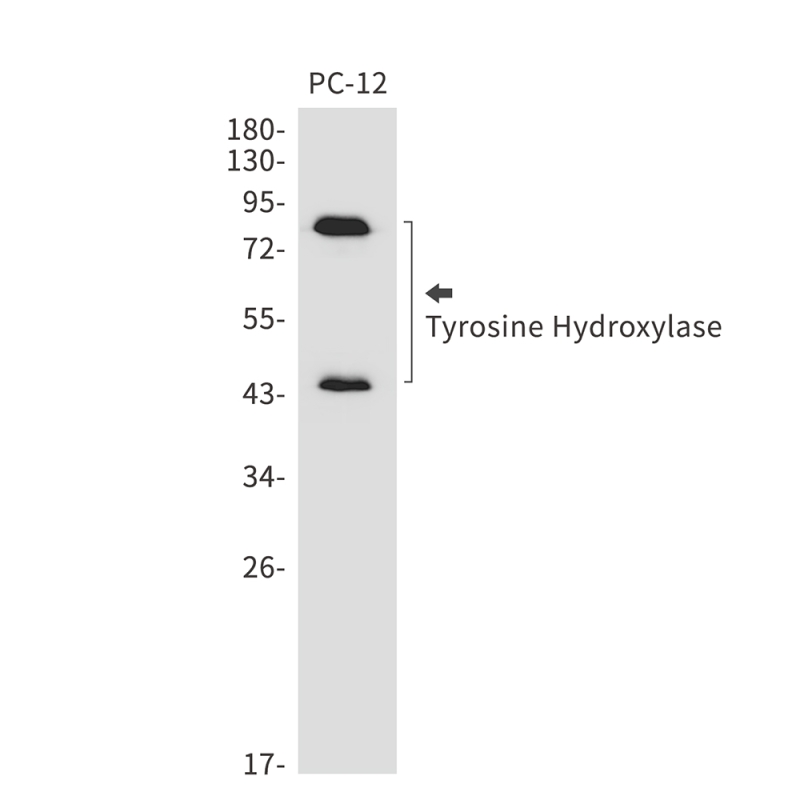
| WB | 1/500-1/1000 | Rat |
| IF | 咨询技术 | Rat |
| IHC | 1/50-1/100 | Rat |
| ICC | 1/50-1/200 | Rat |
| FCM | 咨询技术 | Rat |
| Elisa | 咨询技术 | Rat |
| Aliases | TH; TYH; Tyrosine 3-monooxygenase; Tyrosine 3-hydroxylase; TH;Tyrosine 3 Monooxygenase |
| Entrez GeneID | 7054 |
| WB Predicted band size | Calculated MW: 59 kDa; Observed MW: 59 kDa |
| Host/Isotype | Rabbit IgG |
| Antibody Type | Primary antibody |
| Storage | Store at 4°C short term. Aliquot and store at -20°C long term. Avoid freeze/thaw cycles. |
| Species Reactivity | Rat |
| Immunogen | A synthetic peptide of human Tyrosine Hydroxylase |
| Formulation | Purified antibody in TBS with 0.05% sodium azide,0.05%BSA and 50% glycerol. |
+ +
以下是3篇关于酪氨酸羟化酶(Tyrosine Hydroxylase, TH)抗体的经典文献摘要概括:
---
1. **文献名称**:*Immunohistochemical localization of tyrosine hydroxylase in brain*
**作者**:Nagatsu, T., et al.
**摘要**:该研究首次报道了酪氨酸羟化酶抗体的制备及其在脑组织中的应用,通过免疫组化技术特异性标记多巴胺能神经元,为帕金森病等神经退行性疾病的机制研究提供关键工具。
---
2. **文献名称**:*Tyrosine hydroxylase and regulation of dopamine synthesis*
**作者**:Daubner, S.C., et al.
**摘要**:文章系统综述了TH的生物学功能及其磷酸化调控机制,重点描述了特异性抗体在Western blot和免疫荧光中检测TH蛋白表达及活性变化的应用,强调抗体对研究多巴胺代谢通路的重要性。
---
3. **文献名称**:*Stress-induced changes in tyrosine hydroxylase immunoreactivity in dopaminergic neurons*
**作者**:Tank, A.W., et al.
**摘要**:利用TH抗体探究急慢性应激对大鼠中脑多巴胺能神经元的影响,发现TH蛋白表达水平与应激强度呈正相关,验证了抗体在行为学与分子机制关联研究中的可靠性。
---
(可选)4. **文献名称**:*Antibodies as probes for neurotransmitter-related enzymes*
**作者**:Björklund, A., Dunnett, S.B.
**摘要**:综述类文献中讨论了TH抗体在神经科学领域的广泛应用,包括追踪神经通路、评估神经退行性疾病模型中的神经元存活率,并比较了不同抗体克隆的特异性差异。
---
以上文献涵盖了TH抗体的开发、验证及在神经生物学研究中的关键应用场景。
Tyrosine hydroxylase (TH) is the rate-limiting enzyme in the synthesis of catecholamines, including dopamine, norepinephrine, and epinephrine. It catalyzes the conversion of L-tyrosine to L-DOPA, a critical step in neurotransmitter and hormone production. TH is predominantly expressed in catecholaminergic neurons of the central nervous system (e.g., substantia nigra, locus coeruleus) and peripheral tissues like the adrenal medulla. Its activity is tightly regulated and linked to physiological processes such as mood regulation, stress response, and motor control.
TH antibodies are essential tools for identifying and studying catecholaminergic systems. These antibodies target specific epitopes of the TH protein, enabling visualization and quantification in techniques like immunohistochemistry (IHC), western blotting (WB), and immunofluorescence (IF). Researchers use TH antibodies to map neuronal pathways, assess neurodegenerative conditions (e.g., Parkinson’s disease characterized by dopaminergic neuron loss), and diagnose tumors such as pheochromocytomas or neuroblastomas, which often overexpress TH.
Monoclonal TH antibodies offer high specificity, while polyclonal versions may detect multiple epitopes, enhancing sensitivity. Validation via knockout controls or enzymatic activity assays is critical to ensure reliability. Dysregulated TH expression is also studied in psychiatric disorders, addiction, and autonomic dysfunction. By enabling precise localization and functional analysis, TH antibodies remain pivotal in neuroscience, endocrinology, and clinical pathology research.
×